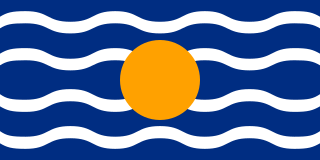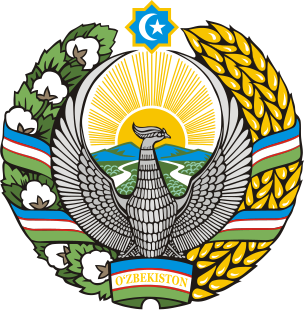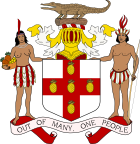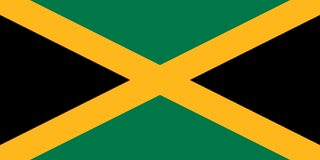
"Jamaica, Land We Love" is the national anthem of Jamaica, officially adopted in July 1962. It was chosen after a competition from September 1961 until 31 March 1962, in which, the lyrics of the national anthem were selected by Jamaica's Houses of Parliament. When Jamaica was granted independence on 6 August 1962, "Jamaica, Land We Love" continued to be officially used as the national anthem.

The West Indies Federation, also known as the West Indies, the Federation of the West Indies or the West Indian Federation, was a short-lived political union that existed from 3 January 1958 to 31 May 1962. Various islands in the Caribbean that were colonies of the United Kingdom, including Trinidad and Tobago, Barbados, Jamaica, and those on the Leeward and Windward Islands, came together to form the Federation, with its capital in Port of Spain, Trinidad and Tobago. The expressed intention of the Federation was to create a political unit that would become independent from Britain as a single state—possibly similar to the Canadian Confederation, Australian Commonwealth, or Central African Federation; however, before that could happen, the Federation collapsed due to internal political conflicts over how the Federation itself would be governed or how it would viably function. The territories that would have become part of the Federation eventually became the nine contemporary sovereign states of Antigua and Barbuda, Barbados, Dominica, Grenada, Jamaica, Saint Kitts and Nevis, Saint Lucia, Saint Vincent and the Grenadines, and Trinidad and Tobago; with Anguilla, Montserrat, the Cayman Islands, and Turks and Caicos Islands becoming British overseas territories. British Guiana (Guyana) and British Honduras (Belize) held observer status within the West Indies Federation.

The British West Indies, sometimes abbreviated to the BWI, is a collective term for the British territories in the Caribbean: Anguilla, Bermuda, the Cayman Islands, Turks and Caicos Islands, Montserrat, the British Virgin Islands, The Bahamas, Barbados, Belize, Antigua and Barbuda, Dominica, Saint Kitts and Nevis, Grenada, Saint Lucia, Saint Vincent and the Grenadines, Guyana, Jamaica, and Trinidad and Tobago. Before the decolonization period in the later 1950's and 1960's it included all British colonies in the region, together with two mainland colonies, as part of the British Empire.

A referendum on self-determination for Algeria was held in France on 8 January 1961. Self-determination was approved by 75.0% of voters overall and 69.5% in Algeria. The government reported voter turnout of 92.2%. Other sources claim that two-fifths of those entitled to vote abstained.

A referendum to approve the Évian Accords ending the Algerian War and granting self-determination to Algeria was held in France on 8 April 1962. It was approved by 90.8% of voters with a 75.3% turnout.

A referendum on the future of the Soviet Union was held on 17 March 1991. The question put to voters was

The flag of the West Indies Federation was used between 1958 and 1962. It bore four equally spaced narrow white stripes with a large orange-gold disc over the middle two lines in the center of the flag, undulating horizontally across a blue field representing the Caribbean Sea and the sun shining upon the waves. The flag was originally designed by Edna Manley. The flag is shown as 1:2; the upper two white stripes reflect the lower ones.

General elections were held for the Legislative Council in Nyasaland in August 1961. The result was a victory for the Malawi Congress Party, which won all 20 lower roll seats and two of the eight higher roll seats.

A constitutional referendum was held in Turkey on 9 July 1961. Following the coup d'état the previous year, a new constitution was drawn up to replace the one from 1924. It was approved by 61.7% of voters, with an 81.0% turnout.

An independence referendum was held in the Republic of Uzbekistan on 29 December 1991, alongside presidential elections. The result was 98.3% of voters in favour, with a turnout of 94.1%.
The Barbados National Party was a minor political party in Barbados. In the West Indies federal election it elected one member to the West Indies Federation House of Representatives, where he sat with the West Indies Federal Labour Party. In the 1961 general elections it received 22% of the vote and won four seats. In 1966 its vote share fell to 10.1% and it was reduced to two seats. The party did not run in subsequent elections.

A referendum on financial issues was held in Puerto Rico on 10 December 1961. The referendum was approved by 82.8% of voters.
A three-part referendum was held in Switzerland on 21 October 1877. A federal law on working in factories was approved by voters, whilst a federal law on compensation for not serving in the military and a federal law on the political rights of settled and travelling people and the loss of rights for Swiss citizens were both rejected.
Two referendums were held in Switzerland in 1879. A federal law on subsidies for railways in the Alps was passed by 70.7% of voters on 19 January, whilst a referendum on the death penalty on 18 May was passed by 52.5% of voters and a majority of cantons.
Two referendums were held in Switzerland in 1887. The first was held on 15 May, asking voters whether they approved of a federal law on spirits, and was approved by 65.9% of voters. The second was held on 10 July, asking voters whether they approved of an amendment made to article 64 of the federal constitution, and was approved by 77.9% of voters and 20.5 cantons.
A referendum on copyright was held in Switzerland on 19 March 1905. Voters were asked whether they approved of a federal resolution on revising article 64 of the constitution, defining the protection rights of inventors. It was approved by 70.4% of voters and a majority of cantons.
Two referendums were held in Switzerland during 1918. The first was held on 2 June on introducing a direct federal tax, and was rejected by a majority of voters and cantons. The second was held on 13 October 1918 on introducing proportional representation for National Council elections, and was approved by a majority of voters and cantons. As a result, proportional representation was introduced in the 1919 elections.
Four referendums were held in Switzerland in 1961. The first two were held on 5 March on an amendment to the constitution regarding oil pipelines and a fuel tax to fund national roads. The constitutional amendment was approved, but the fuel tax rejected. The third referendum was held on 22 October on a popular initiative on using popular initiatives for federal-level laws, and was rejected by voters. The fourth referendum was on a federal resolution on the clock industry, and was approved by two-thirds of voters.
Four referendums were held in Switzerland in 1962. The first was held on 1 April on a popular initiative to ban nuclear weapons, and was rejected by 65% of voters. The second and third were held on 27 May on an amendment to the constitution regarding nature conservation and a federal law amending pay at the federal level. The constitutional amendment was approved, but the law on pay was rejected. The final referendum was held on 4 November on another constitutional amendment on the method of election of the National Council, and was approved by voters.

Federal elections were held in the West Indies Federation for the first and only time on 25 March 1958. The result was a victory for the West Indies Federal Labour Party, which won 25 of the 45 seats in the House of Representatives.











